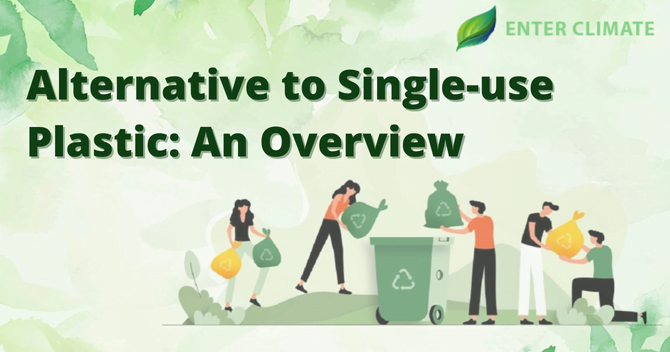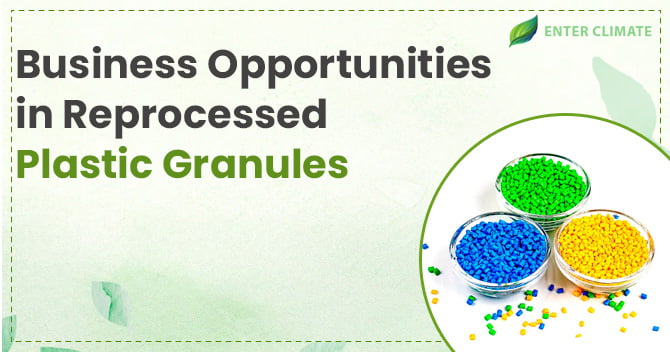Alternative to single-use Plastic: An Overview
 30 Aug, 2022
30 Aug, 2022 
Focus on the following-almost all plastic waste generated by humans from every plastic item ever manufactured still exists on the planet. The simple reason is that petroleum-based plastic degrades very slowly, a massive problem. Plastic has countless merits, but it is one of the most significant challenges for humans today in its waste and discarded form. Discarded Plastic waste can take 200-450 years to degrade completely. Countries worldwide are trying to deal with the ill effects of plastic pollution on the environment, aquatic life and human health. Some are shifting their focus on alternatives like jute, paper and other biodegradable substances as per their utility; many have adopted bans on specific plastic items to curb the use of Plastic. From July 1st 2022, India also banned the manufacture, import, stocking, distribution, sale and use of identified single-use plastic items, which have low utility and high littering potential, all across the country. This ban was implemented to control the plastic waste menace caused by single-use plastic. But many small and medium-scale industries that have been in manufacturing and related business of these items have to look for alternatives. In this article, we will be learning about the existing alternatives to banned items and how related trades and new businesses can profit from the gap that has developed in supply. But the following conditions must be present for an alternative to single-use plastic items.
- It must be easily degradable, biodegradable or compostable.
- The raw material must be cheap, and the manufacturing cost should not be high.
- It should not use any hazardous chemicals in the production and should not have polluting potential.
- It must be durable (should not be susceptible to disintegration in hot-cold or under stress easily)
- The technology of production should be readily available.
Existing Alternatives to Single-Use Plastic in India
Based on the above criteria, the following alternatives to Single-Use Plastic are available in the country.
Degradable Plastic
According to CPCB, degradable plastics production involves the conversion of additive-based polyolefin compounds into film and then into carrying bags, pouches etc. It may be either.
- Photodegradable or oxo-degradable plastics disintegrate into small pieces when exposed to sunlight/oxygen.
- Semi-biodegradable; blends of starch and polyethene (e.g. bioplastic)
- 100% biodegradable; refers only to materials consumed by microorganisms such as bacteria, fungi, and algae. These microorganisms break down the polymer chain, which is ultimately converted to biomass.
Bioplastic
This alternative to single-use Plastic is biodegradable and made of natural materials – providing businesses with eco-friendly options for plastic products and packaging, especially single-use items that contribute to a lot of waste. The bioplastic industry, though in its early stages, is steadily growing. It has begun replacing many disposable items made from petroleum-based Plastic, such as cups, cutlery, packaging, containers and straws.
Types Of Bioplastic
- Starch-Based Bioplastic: Many new industries have started production of single-use plastic items like disposal cups, plates, spoons etc., with starch-based bioplastic. Starch is cheap and abundant in corn, potato, tapioca, pea, wheat, rice etc. Starch-based plastics can be used in various applications as they can be used with various petroleum-based polymers or biopolymers to create composite and degradable materials. These composite materials can then be injection moulded or extruded using standard processing machinery.
- Cellulose-Based Bioplastic: Produced using cellulose esters and cellulose derivatives. Significant applications for cellulose plastics include thermoplastics, extruded films, eyeglass frames, electronics, sheets, rods, etc.
- Moulding materials are the most dominant application segment for cellulose plastics, and the trend is expected to continue.
- Polylactic Acid (PLA) based Bioplastic: Polylactic acid is biodegradable and is similar to polypropylene (PP), polyethene (PE), or polystyrene (PS). It can be manufactured from already existing manufacturing equipment (designed and used initially for petrochemical industry plastics). This makes it relatively cost-efficient to produce. PLA has the second largest production by volume for any bioplastic. The rising demand for flexible packaging is fuelling the growth of the PLA in the packaging industry.
- Polyhydroxyalkanoates (PHA) based Bioplastic: Biodegradable plastics like PHA comprise a group of natural biodegradable polyesters synthesised by microorganisms. The biodegradable and biocompatible properties of PHA make it highly demanding in the biomedical and agricultural fields.
Compostable Plastic
Compostable plastics have the potential to be the next generation of plastics. They come from renewable materials and break down through composting. The demand for polythene bags is huge in India. Compostable plastic bags can be used and are a valuable substitute. The December ban won’t apply to commodities made of compostable Plastic.
Plant-based Alternatives
- Many plants and their products like wood, bamboo, cotton, banana leaves, jute etc. can be used to make many of the banned products. There has been an increase in the demand for paper bags in the country.
Market Overview of Business producing alternatives to Single-use Plastic
As the government has identified plastic straws and plastic cutlery as banned items, these industries are hit the hardest. Comes December 2022, plastic bags having a thickness of fewer than 120 microns will also be prohibited. Many large FMCG and Agro-food companies have begun removing plastic straws from small tetra packs of fruit juices and well as dairy products. They are beginning to shift to paper-based straws and other alternative sustainable solutions. There has been a substantial increase in demand for paper bags. While India consumes 6 billion plastic straws yearly, they will now be replaced with paper straws. While manufacturing bioplastic can cost more than petroleum-based Plastic (20-100%), cheap substitutes are available in many cases.
How to set up Businesses targeting Alternatives to single-use Plastic
The setting of any of the above businesses will require basic amenities such as land, machinery, capital and an understating of the manufacturing process. Even if an entrepreneur understands the what, who, how, and why of business, they must comply with the provisions of authorisation and licencing needs of the business. For setting up a bioplastic or compostable plastic item manufacturing business, one will need the following licences
- CPCB certificate to manufacture Compostable Plastic Products[1]
- Consent NOC: The unit has to obtain Consent to Establish(CTE) and Consent to Operate(CTO) from the concerned SBCB or PCC under Air Act and Water Act.
- EPR Authorisation from CPCB: EPR authorisation is required by Plastic producers, importers and Brand Owners (PIBO) as well as Plastic Waste processors.
Additional Licences and Permits needed: Besides the specific licences and authorisation, some essential registration and certificates are also required by the manufacturer of compostable/ biodegradable Plastic manufacturer.
- Industry Incorporation Certificate
- Registration
- Fire NOC
- BIS Certificate
- Factory’s Licence
Documents Required for CPCB Certificate for compostable Plastic Manufacturer
- Duly filled Form A for obtaining a certificate from the CPCB for compostable plastic by the manufacturer,
- Production details. (eg. capacity for manufacturing compostable plastics, end products and byproducts)
- Registration certificate for production of compostable plastic from the concerned State Pollution Control Board or Pollution Control Committee.
- Consent under Air and Water Act by the concerned Board or committee.
- Flow diagram and manufacturing process
- Test reports as per Indian Standards IS/ISO: 17088.
- Proof of pollution control devices/ measures
- Memorandum of Association
Note: As per Rule 4(h) of the PWM Rules 2016, the certificate is issued within seven working days of successful application.
Conclusion
Biodegradable plastics offer significant environmental benefits by using renewable energy resources and reducing greenhouse gas emissions in many cases. The energy required to synthesise and manufacture biodegradable plastics is generally much lower for most biodegradable plastics than for non-biodegradable plastics. By an estimate, the energy needed to produce biodegradable Plastic is 48% lower than petroleum-based plastic production. Some added benefits include minimum thickness limitations that do not apply to compostable plastics. Bio-plastics, too have been excluded from the plastic waste management rules. Compost derived in part from biodegradable plastics increases the soil’s organic content and water and nutrient retention while reducing chemical inputs and suppressing plant disease. Bioplastics have the same tensile strength as conventional plastic, and there is no visual difference between the two. The advantages are many, but these are not entirely eco-friendly alternatives. Rapid degradation of these substitutes is subject to certain standard conditions. Similarly, some limitations on usability also exist, meaning that they are not the perfect substitute( for instance, compostable Plastic is not suitable for hot foods or liquids.).But these are relatively small compromises when compared to the vast problem that petroleum-based plastic creates. Moreover, the market opportunity created by the ban is an added incentive to go for this business.













